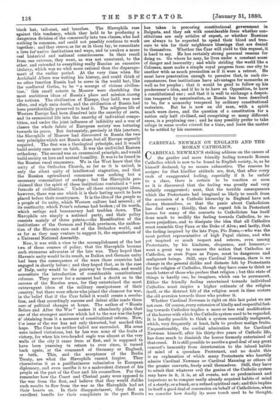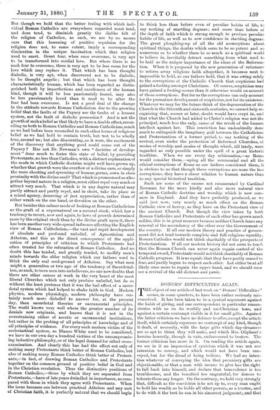CARDINAL NEWMAN ON ENGLAND AND THE ROMAN CATHOLICS.
CARDINAL NEWMAN'S striking address on the causes of the gentler and more friendly feeling towards Roman Catholics which is now to be found in English society, is, as he himself declared, by no means exhaustive. The reasons he assigns for that kindlier attitude are, first, that after every rush of exaggerated feeling, especially if it be unfair to a class, there is certain to be reaction so soon as it is discovered that the feeling was greatly and very unfairly exaggerated; next, that the terrible consequences which the Protestants had imagined as likely to result from the accession of a Catholic hierarchy in England have not shown themselves, so that the panic about Catholicism has died away; thirdly, that the regard felt in Protestant homes for many of the converts to Catholicism has itself done much to mollify the feeling towards Catholics, to re- move prejudices, and to dissipate the idea that all Catholics must resemble Guy Faux or the Duke of Alva; and lastly, that the feeling inspired by the late Pope, Pio Nono,—who was the most perfect representative of high Papal claims, and who yet inspired so much respect and esteem, even among Protestants, by his kindness, eloquence, and humour,— went a great way to remove the notion that Catholics as Catholics, or even Popes as Popes, must be dangerous and malignant beings. Still, says Cardinal Newman, there is no change in the general dislike and distaste felt by Protestants for the religion of Catholics, though they have come to think so much better of those who profess that religion ; but this state of things is hardly one, he imagines, which can be permanent. Either the friendly feeling entertained towards individual Catholics must inspire a higher estimate of the religion itself, or the distrust felt of the religion must in time restore the old aversion towards those who profess it.
Whether Cardinal Newman is right on this last point we are not sure. Of course, every extension of kindly and respectful feel- ing towards Catholics implies a more or less real modification of the horror with which the Catholic system used to be regarded. It is hardly possible to think a system essentially malignant, which, very frequently at least, fails to produce malign fruits. Unquestionably, the cordial admiration felt for Cardinal Newman himself, after his thirty-five years of Catholic life, has done much to diminish the horror formerly entertained of that creed. It is still possible to ascribe a good deal of any great convert's immunity from deterioration to the inbred habits of mind of a quondam Protestant, and no doubt this is an explanation of which many Protestants who heartily admire Cardinal Newman or- Cardinal Manning or others -of the greater converts, freely avail themselves. Still, they have to admit that whatever evil the genius of the Catholic system may have in it, it is, at all events, not so predominant and imperious as to conquer easily already acquired habits of mind of a sturdy, or a frank, or a refined spiritual cast; and this implies in itself a good deal of concession on behalf of Catholicism, when we consider how deadly its mere touch used to be thought.
But though we hold that the better feeling with which indi- vidual Roman Catholics are everywhere regarded must tend, and does tend, to diminish greatly the dislike felt of the religion of Catholics, as such, we are by no means sure that this lessening of positive repulsion for the religion does not, to some extent, imply a corresponding diminution in the unique fascination which that religion used to exert. Great fear, when once overcome, is very apt to be transformed into cordial love. But where there is no such fear to overcome, there is very apt to be less room for the love which may replace it. That which has been thought diabolic, is very apt, when discovered not to be diabolic, to be thought angelic ; but that which has been thought characteristically human, which has been regarded as distin- guished both by imperfections and excellences of the human kind, though it will be less passionately feared, may also be less passionately loved than it used to be after the fear had been overcome. Is not a good deal of the change in the attitude towards Roman Catholicism due to the growing belief that the faults of the Papacy are the faults of a human system, not the fault of diabolic possession? And is not the growth of such abelief as that likely to have a double effect, recon- ciling us both to Roman Catholics and Roman Catholicism, much as we had before been reconciled to such other forms of religious belief as we had held to contain truth, but -not to be wholly true, around us ; but also discounting, as it were, the excitement of the discovery that anything good could come out of the Papacy? Has not Dr. Newman's own "doctrine of develop- ment" done much to foster this state of belief, by providing Protestants, no less than Catholics, with a distinct explanation of the mode in which Catholic doctrine might well have grown up, whether that growth were the overflow of a divine care, or simply the mere shooting and sprouting of human germs, sown in close proximitywith the divine seed? That which is pronounced as alto- gether beyond nature in a religion, must either repel very much or attract very much. That which is in any degree natural may partly attract and partly repel, and in short, take its place as a mixed agency, deserving of just appreciation, rather than of either wrath on the one hand, or devotion on the other.
But besides this calmer mode of looking at Roman Catholicism as the graft of a supernatural on a natural stock, which has a tendency to revert, now and again, to laws of growth determined more by the original stock than by the divine graft upon it, there has been another very wide-spread influence affecting the English view of Roman Catholicism,—the vast and rapid development of absolute and profound unbelief, of Agnosticism and Atheism, and this as the direct consequence of the appli- cation of principles of criticism to which Protestants had often trusted for the refutation of Roman Catholics. And no doubt this has tended, and greatly tended, to mollify men's minds towards the older religion which our fathers used to think the only real seed-ground of Atheism. Say what men might a generation or two ago of the tendency of Sacerdotal- ism, as such, to turn men into unbelievers, no one now doubts that there are other causes at work in the very heart of the most liberal Churches which not only prodike unbelief, but do so without the least pretence that it was the bad effect of a sacer- dotal system which had helped to shake faith in God. Modern physics, modern physiology, modern philosophy have cer- tainly much more disbelief to answer for, at the present day, than sacerdotal theories or sacramental principles. The world knows very well where the greater number of its denials now originate, and knows that it is not in the overstraining either of ascetic or sacramental institutions, but rather in the probing of all principles of knowledge and of all principles of evidence. For every such modern victim of the ecclesiastical system, as Blanco White used to be considered, we have in our own day a hundred victims of the uncompromis- ing inductive philosophy, or of the legal demand for sifted cross- examination. And clearly this has had the effect not only of making many Protestants think better of Roman Catholics, but also of making many Roman Catholics think better of Protest- ants,—in fact, of drawing Roman Catholics and Protestants together on the common ground of positive belief in God and in the Christian revelation. Thus the distinctive positions of Roman Catholics,—those by which they are separated from Protestants,—have of late years dwindled in importance, as com- pared with those in which they agree with Protestants. When the issue becomes one between practical Atheism and any sort of Christian faith, it is perfectly natural that we should begin to think less than before even of peculiar habits of life, to say nothing of startling dogmas; and more than before of the depth of faith which is strong enough to produce peculiar habits of life, as well as to sow confidence in startling dogmas. The great ploughing-up of all the old assumptions about spiritual things, the doubts which seem to be so potent and so numerous as to whether there be so much as a spiritual world to believe in, inevitably detract something from what used to be held as the unique importance of the ideas of the Reforma- tion. When it is proposed by the new generation of reformers to reform away religious faith altogether, it becomes next to impossible to hold, as our fathers held, that it was owing solely to the corruptions of the Catholic Church that scepticism had gained a footing amongst Christians. Of course, scepticism may have gained a footing sooner than it otherwise would on account of those corruptions. But for us the corruptions can only account for the premature development of scepticism, not for its existence. Whatever we may for the future think of the degeneration of the Church in the fifteenth and sixteenth centuries, we cannot help re- cognising that, sooner or later, doubt would have crept in, and that what the Church had added to Christ's religion was not the principal, much less the only, cause of the revolt of the human intellect against her. This conviction has undoubtedly done much to extinguish the imaginary gulf between the Catholicism and Protestantism of a former period, to say nothing of the revival, even under the protection-of Reformed Churches, of modes of worship and modes of thought which, till lately, were regarded as only possible under the spell of a great historic tradition. When we see every day schismatics,—as Rome would consider them,—aping all the ceremonial and all the ethical corruptions of Rome as our fathers considered them, it is obvious to us that though these corruptions are none the less corruptions, they have a closer relation to human nature than to any special historical tradition.
Such are some of the causes not enumerated by Cardinal Newman for the more kindly and also more natural view of Roman Catholic doctrine and worship which is now com- mon in England. And they have probably produced, as we said just now, very nearly as much effect on the Roman Catholic view of heresy, as they have on the Protestant view of the ancient Church. But though the view taken by both Roman Catholics and Protestants of each other has grown much milder, this is in great measure because neither Church fears any renewal of the ascendancy of the other over the Government of the country. If all our modern theory and practice of govern- ment did not tend towards complete and full religious equality, Roman Catholics would not think charitably of the prospects of Protestantism. If all our modern history did not seem to teach that the Roman Church can never again regain control of the temporal sword, Protestants would not think charitably of Roman Catholic progress. It is as equals that they have partly ()eased to fear, and partly begun to respect each other. Let either be at all likely once more to regain the upper hand, and we should soon see a revival of the old distrust and panic.



































 Previous page
Previous page